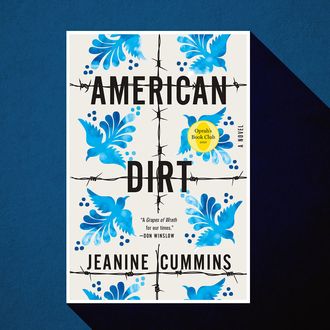
On Tuesday morning, Oprah Winfrey announced her latest Oprah’s Book Club pick, the new novel American Dirt by Jeanine Cummins. Winfrey tweeted: “From the first sentence, I was IN … Like so many of us, I’ve read newspaper articles and watched television news stories and seen movies about the plight of families looking for a better life, but this story changed the way I see what it means to be a migrant in a whole new way.” Winfrey also posted a video of her endorsement to the Oprah’s Book Club Twitter account, saying, “I was opened, I was shook up, it woke me up, and I feel that everybody who reads this book is actually going to be immersed in the experience of what it means to be a migrant on the run for freedom. So I want you to read. Come read with us, and then join the conversation with Jeanine Cummins on Apple TV+ coming this March.”
Book Twitter reacted to the announcement with swiftness, although perhaps not in the way Oprah’s team would have wanted, citing the recent #OwnVoices movement. American Dirt has been the subject of controversy and criticism since 2019, when early readers first offered their opinions after seeing advance copies. The book has been called “stereotypical,” and “appropriative” for “opportunistically, selfishly, and parasitically” telling the fictional story of a Mexican mother and son’s journey to the border after a cartel murders the rest of their family. One of the more common knocks is that the book engages in “brownface,” incorporating a nominally Mexican perspective that was written by a woman who — as recently as 2016 — identified as “white.” In the lead-up to American Dirt’s release, Cummins revealed she has a Puerto Rican grandmother. The conversation surrounding American Dirt’s “ripped from the headlines” approach to telling this migrant story in an American voice for American readers places it within ongoing debates in the lit world about who can tell what stories.
Some professional critics also had at America Dirt in the days before its January 21 release. New York Times book critic Parul Sehgal said that the “rapturous and demented praise” the book has received in the press might be owed in part to the fact that “tortured sentences aside, American Dirt is enviably easy to read” and “determinedly apolitical. The deep roots of these forced migrations are never interrogated; the American reader can read without fear of uncomfortable self-reproach.” Some of that praise also comes from the Times; on Sunday in the Book Review, Lauren Groff was ultimately ambivalent but called the book “propulsive” and “swift,” and regarded its polemical “uncomplicated moral universe” as a feature rather than a bug. Groff (who, for the record, is white) praises Cummins’s efforts and excuses her appropriation, but Sehgal (who is not) questions Cummins’s stated motivation in writing this story:
Shouldn’t the story matter, her effort to individuate people portrayed as a “faceless brown mass” (her words)? In the book’s afterword, she agonizes about not being the right person to write the book (“I wished someone slightly browner than me would write it”) but decides that she has a moral obligation to the story.
According to The Hollywood Reporter, American Dirt has already been optioned for a movie adaptation by Charles Leavitt, the writer of Blood Diamond, and Imperative Entertainment, the production company behind Clint Eastwood’s The Mule. While you wait for that come out, you can add your name to a 150-plus person hold list for American Dirt at your local library and catch Oprah’s Apple TV+ feature on it in March.


